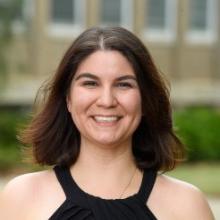Member Spotlight: Stephanie Miller
Associate Professor and Director of Experimental Training, Department of Psychology, The University of Mississippi
What interested you in becoming a developmental scientist?
I actually wanted to be an elementary school teacher growing up. I come from a family of educators and spent a lot of time in my mother’s classroom, which inspired my interest in learning and cognition. Once I started taking developmental and cognitive psychology coursework, I was thrilled to discover I could pursue a career as a developmental scientist conducting and applying novel research focused on understanding children’s thought.
What words of wisdom might you pass on to someone on their very first day after deciding to get a Ph.D. in developmental science or related?
One thought I would share would be to appreciate the journey. There are many new experiences and numerous opportunities that will unfold as you move throughout your studies. There is no one correct path to becoming a developmental scientist and it is not a solitary journey. We learn much from many individuals across our academic and non-academic lives and draw upon them for support. As things change and you move forward, it is important to be open and revisit why you have chosen this path and what is important to you moving forward with this work.
What’s your favorite aspect of SRCD membership?
One of my favorite aspects of SRCD is the opportunity it provides to connect with and learn from others committed to developmental science and its potential for informing positive development. I have especially enjoyed joining and learning from a community of scholars across all different stages of their careers within mentoring programs like the Frances Degan Horowitz Millennium Scholars Program.
Who inspires you?
I have always been inspired by the young students and children I have worked with throughout my life and career. The amount of growth, flexibility, and resilience that young children display in their thought and behavior never ceases to amaze me. It is exciting to observe such dramatic developments across the first years of life, tracing the more dependent and nonverbal behaviors in infancy to the verbal problem-solving behaviors exhibited in preschool. My experiences working with children have inspired me to work toward better understand how cognition emerges and is shaped within the sociocultural environment in the first years of life.
What is a typical day like for you?
I like to schedule time to write earlier in the mornings on the days I do not have classes. One of the most important elements of my job to me is mentoring students in psychology and developmental science, so I usually have meetings or work related to working with students as the director of our graduate program, the chair of the mentoring program for the Society of Indian Psychologists, with students from my research team, or with students from other mentoring programs. I also usually build in time for other administrative meetings, attending talks, and answering emails. On most days, I like to make time to walk, cook, and work on other creative projects like beading.
